Spurious drugs flood Andhra Pradesh, patients suffer

Visakhapatnam: Sensing that something was wrong with a batch of thiopentone sodium injections, doctors at the Government Hospital for Mental Care in Visakhapatnam alerted officials at the Regional Drug Control Administration.
This injection is used as an ultra-short-acting depressant of the central nervous system which induces hypnosis and anaesthesia. When the drug was sampled and analysed at the laboratory, it was found to be of sub-standard quality.
The officials of the Regional Drug Control Administration of Vizag have filed a case against Kwality Pharmaceuticals Ltd., an Amritsar-based company which produced the medication.
Piperacillin/tazobactam, a combination antibiotic medication supplied to King George Hospital by Minopharm Laboratories Limited of Prakasam district, was also found to be of sub-standard quality; and meloxicam, a non-steroidal anti-inflammatory drug supplied to Veterinary Department by Himalaya Meditek of Dehradun, was also found unfit for use.
These are among the cases unearthed by the Andhra Pradesh Drug Control Administration (APDCA) in recent times. Despite all the restrictions and regulations imposed by the APDCA, sub-standard and spurious medications continue to flood Andhra Pradesh.
This has found to be particularly true in the case of medications supplied by bulk drug manufacturers in Himachal Pradesh, Assam, Gujarat, and Rajasthan. Often these sub-standard drugs contain an insufficient amount of the active ingredient, leaving them unable to act against the disease-causing microbes, and causing the organism to become more virulent. This eventually leads to drug-resistance, making even the highest quality drugs obsolete in further courses of treatment, and it can cause death of the patient.
L.A. Govindam, Deputy Director at the Regional Drug Control Administration of Visakhapatnam, said that some drugs were either grossly sub-standard or spurious, or they had defects of variation in quality.
“Some drugs even fail in the dissolution test. Several factors such as atmospheric exposure, the manufacturing process, machine compression setting, change in moisture levels, chipping, and issues with the binding agent also impact the quality of medication. One drug inspector has been dedicated to the task of testing samples from the end process of each pharmaceutical company,” he said.
In 2015-16, 203 of the 2,711 samples tested by the state drug controller were found to be unfit. They were either sub-standard or spurious or adulterated. These are the kind of drugs that are being supplied to government hospitals, and can affect a large number of patients, given the reach and scale of these institutions.
M.D.R. Prasad, the APDCA Director In-Charge, said these cases have a high conviction rate of 60 per cent in a court of law. “Special court hearings held by the Additional District Judge help us expedite the trial of these cases. Hundreds of manufacturers and individuals have been convicted in the past few years,” he said.
Given the huge profits earned in the industry, these companies try to push adulterated or poor quality drugs to market. Often, medications from noted brands are also found to fall into the sub-standard bracket. Manufacturers try to increase their margins by reducing the amount of active ingredient, and substituting it with other ingredients in order to make each pill look and weigh the same as the original drug.
Offenders utilise lacunae to escape
The Drugs and Magic Remedies (Objectionable Advertisements) Act (DMROA) of 1954 needs a shot in the arm. Offenders booked under this Act escape with just a penalty when convicted, because the prescribed sentence is either imprisonment or penalty.
On the other hand, the cases filed against drugs that are Not of Standard Quality (NSQ), can attract life imprisonment and a penalty. A case was recently booked against Fizikem Laboratories Private Limited under the Drugs and Magic Remedies (Objectionable Advertisements) Act of 1954, for false claims made in the promotions of their product Madhucure.
Another case has been booked against Noel Pharma India Pvt Ltd for false claims regarding their product Nefdyl Cold.But the loophole in the Act has been allowing unscrupulous practitioners to walk free.
Many drugs and remedies are advertised across print and electronic media as having magical properties, such as being able to cause drastic weight loss within a month, increase memory power, improve stamina and sexual potency, and cure venereal diseases.
There also advertisements for kavachas, charms and talismans that have the ability to ward off evil and cure various conditions. As ludicrous as the claims of these magic products may be, some gullible people fall for their tricks and try to self-medicate; they end up losing their money and ruining their health. Some also fall prey to quacks.
Andhra Pradesh Drug Control Administration Director In-Charge, M.D.R. Prasad, said that conviction in an NSQ case attracts a minimum of one year of imprisonment, and it may be extended to life imprisonment as well. Additionally, the convict is also liable to pay a penalty. “Many cases booked by the APDCA have ended in sentences of three-year imprisonment and penalties in lakhs,” he said.

